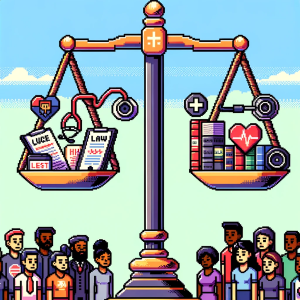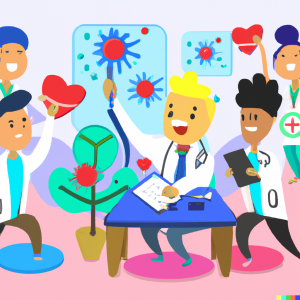
Ethical Dilemmas in Public Health and the Quest for Health Equity
Public health (PH) practitioners are driven by a deep commitment to promote health equity and social justice. Yet, they often find themselves at the crossroads of profound ethical dilemmas due to systemic issues within health care systems that don’t always prioritize these values. A recent study delves into these ethical tensions, particularly in the areas of mental health promotion and prevention of harms of substance use.
The Dual Challenge of Biomedicine and Social Determinants of Health
One of the key tensions identified in the study revolves around the dominance of biomedicine, which focuses on individual diseases and treatments, overshadowing the broader social determinants of health. This biomedical focus often results in resources being allocated primarily towards acute care and disease treatment rather than preventative measures that address the root causes of health inequities. A PH practitioner from the study explained how difficult it is to quantify prevention, “It’s hard to say we prevented something when the outcome should be nothing,” highlighting the challenge in justifying preventative health programs in a system that values visible, immediate results.
Systemic Issues: Checklists vs. Situational Care
Another significant challenge is the rigid adherence to procedural checklists and guidelines, which can impede personalized care. Health systems driven by standard assessments and eligibility criteria often overlook the unique circumstances of individuals needing care. One interviewee voiced concern over the systemic push for targeted programs, which assess risk without considering a patient’s broader social context. This can lead to a mismatch between the services provided and the actual needs of the community, undermining efforts to promote health equity.
Stigma and Discrimination: An Ongoing Battle
The stigma associated with mental health issues and substance use is pervasive within healthcare systems and society. This stigma exacerbates the challenges faced by those at the social margins, who often encounter discrimination based on race, gender, and economic status. The practitioners noted that stigma and discrimination not only affect the health outcomes of individuals but also influence the level of care they receive, with one practitioner recounting, “Clients often don’t seek help until it’s almost too late because of how they’ve been treated in the past.”
Surveillance vs. Autonomy
The delicate balance between public safety and individual autonomy presents yet another ethical challenge. Public health mandates, such as communicable disease reporting, often require practitioners to navigate complex situations where they must maintain client confidentiality while protecting public health. The study reveals the emotional and ethical strain on practitioners as they attempt to uphold both duties, especially in cases where immediate action may be necessary but could breach trust with the client.
Moving Forward: Ethics in Action
This study not only highlights the everyday ethical challenges faced by PH practitioners but also emphasizes the need for frameworks that better support ethical decision-making in public health. Relational ethics, which considers the interconnectedness of individuals and the societal structures that influence health, is suggested as a promising approach to developing these frameworks. This approach encourages a more nuanced understanding of how social, economic, and political factors intersect to affect health outcomes, advocating for policies that truly reflect the values of health equity.
Your Thoughts?
As we discuss these complex issues, it’s essential to engage in a broader conversation about how we can collectively address these ethical challenges in public health. I encourage you to share your thoughts and experiences in the comments section below.
- How can public health systems better integrate ethical considerations into their practices?
- What changes would you like to see to promote health equity more effectively?
Lead the Way in Public Health – Get Your Weekly Insight!
Ready to lead the charge in health advocacy and research? ‘This Week in Public Health’ delivers essential weekly updates, keeping you informed and ahead in the dynamic field of public health. With insights on the latest breakthroughs and initiatives, our newsletter is your gateway to being a proactive leader. Subscribe for free and start shaping the future of public health today!
About the Author
Jon Scaccia, with a Ph.D. in clinical-community psychology and a research fellowship at the US Department of Health and Human Services with expertise in public health systems and quality programs. He specializes in implementing innovative, data-informed strategies to enhance community health and development. Jon helped develop the R=MC² readiness model, which aids organizations in effectively navigating change.



